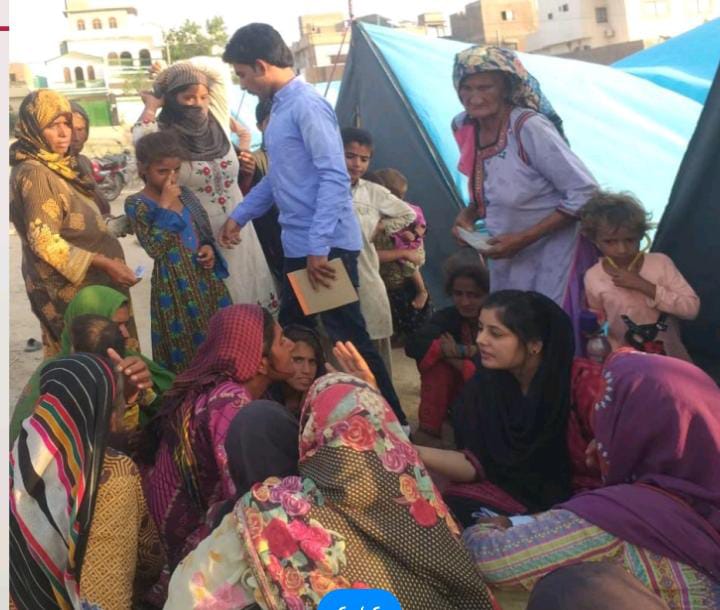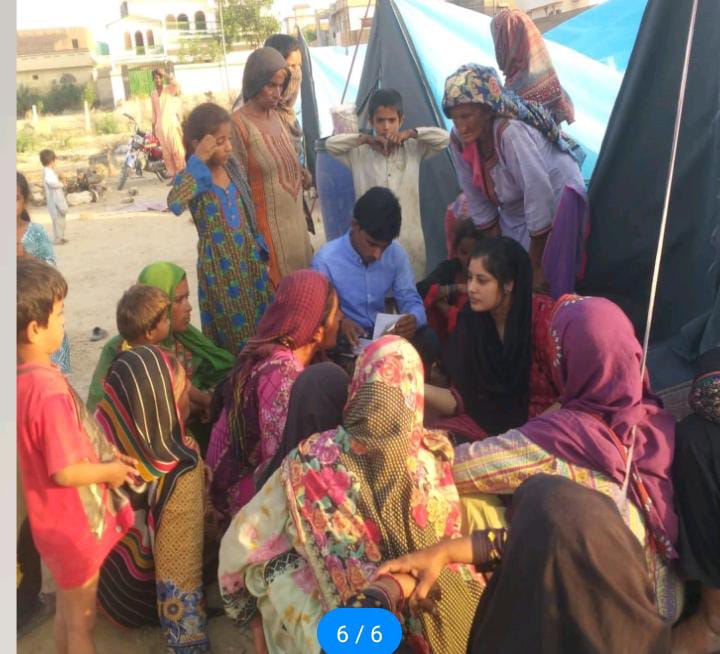
The location where they lived near Jamshoro resembled a jungle. There was no facility available like health, education, sanitation, shelter, clothing, food etc.
By Maria Memon
Last year’s flooding in Sindh made history, as its effects on the impoverished have altered their life forever. Unquestionably, disasters cause vulnerabilities in a variety of ways, but what and how the already vulnerable, particularly women, lived, felt, and suffered every day in the extreme cold or are facing scorching weather, is no man’s concern.
Since June 2022, we have been flooded with the numbers, figures, charts, diagrams and fancy colorful stylish data to reflect the miseries of the people. Unfortunately, there is hardly an in-depth account that presents that how the flood has devastated human relations, destroyed the small happiness of the poor, shattered the innocent dreams and killed the feelings of the thousands of flood-affected women.
Spending time with the most vulnerable population during chilling weather had shattered the illusion between what we hear in the news and what the women suffer in the aftermath of the flood.
Many women said that they had some mental peace due to communal, collective and pleasant living but the floods have altered their lives and made it miserable.
Change in women’s life style has greatly impacted upon the women’s mental health
Post-flood survival for women have been very difficult. There were women with diabetes. They had dull faces and they shivered due to insufficient health care and humanly livable environment. Many women were troubled about their children’s health.
The location in which they lived near Jamshoro resembled a jungle. There was no available facility like health, education, sanitation, shelter, clothing, food etc. People also consumed contaminated water. The pregnant women were suffering greatly and had no place to sleep. They had little rest. There was no location for restrooms. Doctors failed to respond to flood affected patients. Their response was different showing little empathy. Before the floods, women enjoyed their life and had worked in the agricultural fields. They formerly belonged to peasant groups and had their life schedule of earning money, buying needful things and lived less dependent to these urbanities educated rich.
Change in women’s life style has greatly impacted upon the women’s mental health. “We never knocked anyone’s door for money and food neither we do now but it kills us seeing our children sleep hungry, get sick and spend this winter without proper winter clothes,” they said.
Women spent the entire day contemplating post-flood tragic events and fretting about future cultivation.
We are treated as subhuman by these educated elite human beings
Women work as housemaids in order to earn a living and provide food for their families. They could barely earn 50 to 70 rupees daily. What food can they buy to this amount? Just floor price is sky rocketing. “We hardly eat a single meal improperly.” They require additional meals but lack the money. They could not eat adequately because typically families consisted of six to seven individuals.

Women said that their men are discriminated due to the stigmas associated with the displaced people that they are criminal, liars and lack the modesty to hire them. “We are treated as subhuman by these educated elite human beings.” One woman said in an agony.
Experiencing women’s quotidian living, it felt that the elites held the poor people’s survival strategies. Women claimed that God provides food through the hands of elites. Tents were shattered by the cold, which caused seasonal illness. Women argued that since we are poor and vulnerable hence, we endure.
I recall a woman questioning me saying that “Sindh and Sindhi are famous for their kindness and hospitality. They don’t let anyone sleep hungry. We thought we are guests to you; we were treated as if we were animals when we visited the city. Do we deserve such conduct?” Her question was genuine. Where is the welcoming Sindh and Sindis? This catastrophic event undermines the cultural ethics, civilizational principles and hospitality.
Women are losing their ability to survive. Numerous women were quite. They did not speak a single word, but showed their agonized expression. Their eyes told so many tales, and they desired to ask so many questions. However, their voices were becoming degraded owing to terrible circumstances. They desired to return home. They still had hope for a descent humanly life. The only source of hope for them is the God.
__________________
 Maria Memon is BS Final Year student at the Department of Anthropology and Archaeology, University of Sindh, Jamshoro, Sindh, Pakistan
Maria Memon is BS Final Year student at the Department of Anthropology and Archaeology, University of Sindh, Jamshoro, Sindh, Pakistan